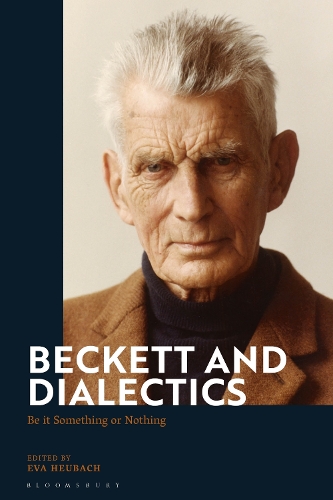
Beckett and Dialectics: Be it Something or Nothing
(Hardback)
Available Formats
Publishing Details
Beckett and Dialectics: Be it Something or Nothing
By (Author) Eva Heubach
Bloomsbury Publishing PLC
Bloomsbury Academic
11th February 2021
United Kingdom
Classifications
Tertiary Education
Non Fiction
Philosophy of language
Philosophy
828.91409
Physical Properties
Hardback
208
Width 156mm, Height 234mm
467g
Description
For a long time, analysis of the work of Samuel Beckett has been dominated by existentialist and post-structuralist interpretations. This new volume instead raises the question of how to understand Beckett via the dialectics underpinning his work. The different chapters explore how Beckett exposes and challenges essential dialectical concepts such as objectivity, subjectivity, exteriority, interiority, immanence, transcendence, and most crucially: negativity. With contributions from prominent scholars such as Alain Badiou, Mladen Dolar, and Rebecca Comay, Beckett and Dialectics not only sheds new light on how Beckett investigates the shapes, types, and forms of negation as in the all-pervasive figures of nothing, no, null, and not but also examines how several phenomena that occur throughout Becketts work are structured in their use of negativity. These include the relationships between voice and silence, space and void, movement and stasis, the finite and the infinite and repetition and transformation. This original analysis lends an important new perspective to Beckett studies, and even more fundamentally, to dialectics itself.
Reviews
The Unnamable begins with questions of method: 'How proceed By aporia pure and simple Or by affirmations and negations invalidated as uttered '. Accordingly, the contributors of this lively collection proceed by moving between pseudo-couples like Hegel and Adorno exchanging their negativities and Becketts quasi-dialectics of non-relation. * Jean-Michel Rabat, University of Pennsylvania, American Academy of Arts and Sciences, USA *
Beckett and Dialectics is an outstanding collection of essays on Beckett, driven not simply by scholarly interest in the literary giant, but by genuine philosophical encounters with his work, resulting in true passion and necessity of engaging with it. This makes the volume a particularly vivid and exciting read. * Alenka Zupancic, Professor of Philosophy and Psychoanalysis, The European Graduate School, Switzerland *
Author Bio
Eva Heubach is a Visiting Assistant at the Graduate School of Arts & Sciences (Department of Germanic Languages and Literatures) at Yale University, USA. She is also a fellow at the Friedrich Schlegel Graduate School, Freie Universitt Berlin, Germany and a doctoral candidate at the Humboldt-Universitt zu Berlin, Germany.
